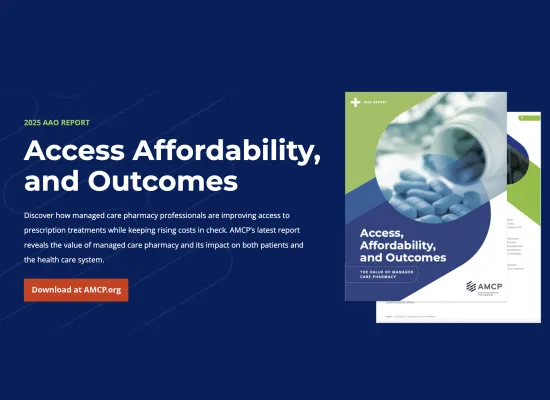
JMCP Research Highlight: Disability Drives High Prevalence of Opioid-Related Disorders in the Medicare Fee-for-Service Population
Alexandria, Va., Jan. 4, 2019 — The prevalence of those diagnosed with opioid-related disorders in the Medicare fee-for-service (FFS) population — at 13.1 per 1,000 persons — is higher than among any other studied payer groups, and the majority of disorders (76.2%) were found among those receiving Medicare based on disability, according to a study in the current issue of the Journal of Managed Care & Specialty Pharmacy (JMCP).
The study also finds that the prevalence of “at-risk abuse” — at 117.4 per 1,000 persons — was 9 times higher than the prevalence of diagnosed opioid-related disorders, defined as opioid use disorder or poisoning by opioid. Prevalence and costs of opioid-related disorders among the Medicare FFS population has not been studied before, according to JMCP, the official journal of the Academy of Managed Care Pharmacy.
“Previous research using similar methodology has shown that the prevalence and cost of misuse/abuse is higher in government-insured populations, however, the Medicare population has not been evaluated,” says Gary M Oderda, PharmD, MPH, Professor Emeritus at the University of Utah College of Pharmacy, a co-author on the study.
Overall annual costs of those diagnosed with opioid-related disorders were significantly greater than those of the matched controls — $46,194 vs. $21,964 — with a mean annual excess cost of $24,230. Similarly, overall annual costs for at-risk patients were significantly greater than those of the matched controls — $36,224 vs. $21,685 — with a mean annual excess cost of $14,539.
The study found that patients diagnosed with opioid-related disorders represent an excess annual cost of nearly $5 billion among Medicare beneficiaries, Oderda notes.
“Despite efforts to address opioid misuse, this study highlights that, when compared to prior research, rates of opioid-related disorders in Medicare fee-for-service are at least as high as in commercial populations, and almost 2-fold the prevalence in a prior study of a managed Medicare population,” says JMCP Editor-in-Chief Laura E. Happe, PharmD, MPH.
“Importantly, this research identifies a disproportionate rate of abuse among people with a disability, highlighting the need for focused efforts for this unique population,” she says. “Specifically, policies and access to opioid use disorder treatment must be a primary focus.”
Read the article, “The Prevalence and Cost of Medicare Beneficiaries Diagnosed and At Risk for Opioid Abuse, Dependence, and Poisoning,” in the January 2019 issue of JMCP at http://bit.ly/2BWwV1y.
About JMCP
The Journal of Managed Care & Specialty Pharmacy publishes peer-reviewed original research manuscripts, subject reviews, and other content intended to advance the use of the scientific method, including the interpretation of research findings in managed care pharmacy. It is dedicated to improving the quality of patient care by providing its readers with the results of scientific investigation and evaluation of clinical, health, service, and economic outcomes of pharmacy services and pharmaceutical interventions, including formulary management. www.jmcp.org.
Featured News & Resources
See Full CalendarAI Pre-Conference Program
AMCP Southwest Day of Education
Upcoming Events
AMCP offers a wide variety of educational opportunities, from events and webinars to online training.







